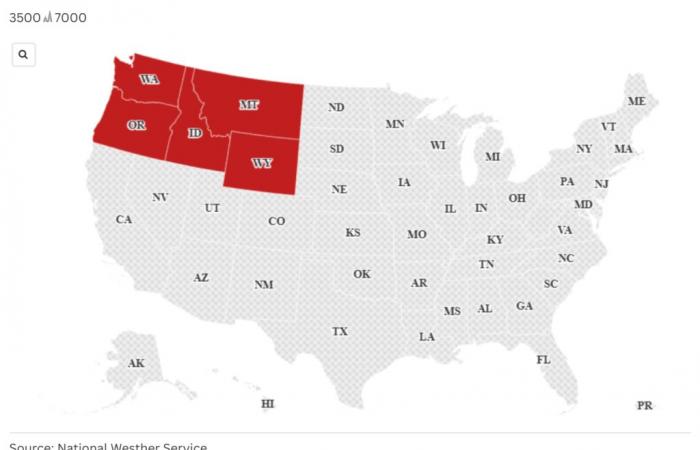Multiple winter storm warnings have been issued across five different states, with some advising people avoid travel.
Different parts of Oregon, Washington, Idaho, Wyoming and Montana are under winter storm warnings with heavy snow expected across all these states.
Almost every one of the warnings in place advises people not to travel in these conditions.
Oregon
Several warnings cover counties in the southeast of the state, with some going into California. One includes Highway 97 near Mt. Hebron, Medicine Lake, and the Warner Mountains, from 4 p.m. to 10 p.m. PST on Monday.
Another, in place from 1 p.m. to 10 p.m. PST on Monday, includes portions of highways 58, 230, 138, 62, 140 and 66.
The Medford National Weather Service (NWS) said: “Travel could be very difficult to impossible. The hazardous conditions could impact the Monday morning and evening commutes. Strong winds could cause extensive damage to trees and power lines.
“If you must travel, keep an extra flashlight, food, and water in your vehicle in case of an emergency.”
“Persons should consider delaying all travel,” the NWS said. “Motorists should use extreme caution if travel is absolutely necessary.”
Meanwhile, a separate winter storm warning is in place for eastern Douglas County Foothills County—from 1 p.m. to 10 p.m. PST on Monday.
Portland’s NWS has issued a winter storm warning for the western foothills of the northern and central Oregon Cascades, with heavy snow expected, from 4 p.m. to 10 p.m. PST on Monday.
“Travel could be very difficult,” the service said. “Patchy blowing snow could significantly reduce visibility.
“Significant snowfall with periods of heavy snowfall rates will combine with low visibility to create very difficult driving conditions,” along the East Slopes of the Oregon Cascades, forecasters said.
Pendleton’s NWS said: “If travel is absolutely necessary, drive with extreme caution. Consider taking a winter storm kit along with you, including such items as tire chains, booster cables, flashlights, shovel, blankets and extra clothing.
“Also take water, a first aid kit, and anything else that would help you survive in case you become stranded.
“Do not touch downed lines and report any power outages to your electric company. Travel is highly discouraged due to slick roadways and the possibility of downed trees and power lines.”
Washington
In Washington, a winter storm warning is currently in effect until 10 p.m. PST on Monday, for Mazama, Holden Village, Loup Loup Pass, Stehekin, Winthrop, Conconully, Methow, Twisp, and Stevens Pass.
“Motorists should use extreme caution if travel is absolutely necessary,” the Spokane NWS said.
Another warning covers Dobson Pass, Mullan, Osburn, Lookout Pass and the Fourth of July Pass until 10 p.m. PST on Monday. Heavy snow is expected with the NWS stressing that “travel could be very difficult over Lookout Pass.”
Meanwhile, a winter storm warning issued on Saturday is in place from 5 a.m. on Sunday to 10 a.m. PST on Monday, covering slopes and passes for much of the Cascades.
“Roads, and especially bridges and overpasses, will likely become slick and hazardous,” the Seattle NWS said.
Idaho
Heavy snow is expected in Idaho as well, with a winter storm warning in place across the Centennial Mountains, in Island Park, from 5 p.m. on Sunday to 8 p.m. MST on Monday.
The Pocatello NWS said: “Travel could be very difficult. The hazardous conditions could impact the Monday morning and evening commutes.”
Wyoming
A winter storm warning is in place from 10 a.m. on Sunday to 10 p.m. MST on Monday across the Teton and Gros Ventre Mountains.
Heavy snow is expected, with total snow accumulations forecast to reach up to 20 inches for the highest elevations.
The Riverton NWS said: “Travel could be very difficult to impossible. The hazardous conditions could impact travel over mountain passes, such as Teton and Togwotee Passes.”
Montana
A winter storm warning covers the I-90 Lookout Pass to Haugan until 11 a.m. on Sunday—heavy snowfall is forecast through the day and into the night.
The Missoula NWS warned of “dangerous or impossible traveling conditions.”






